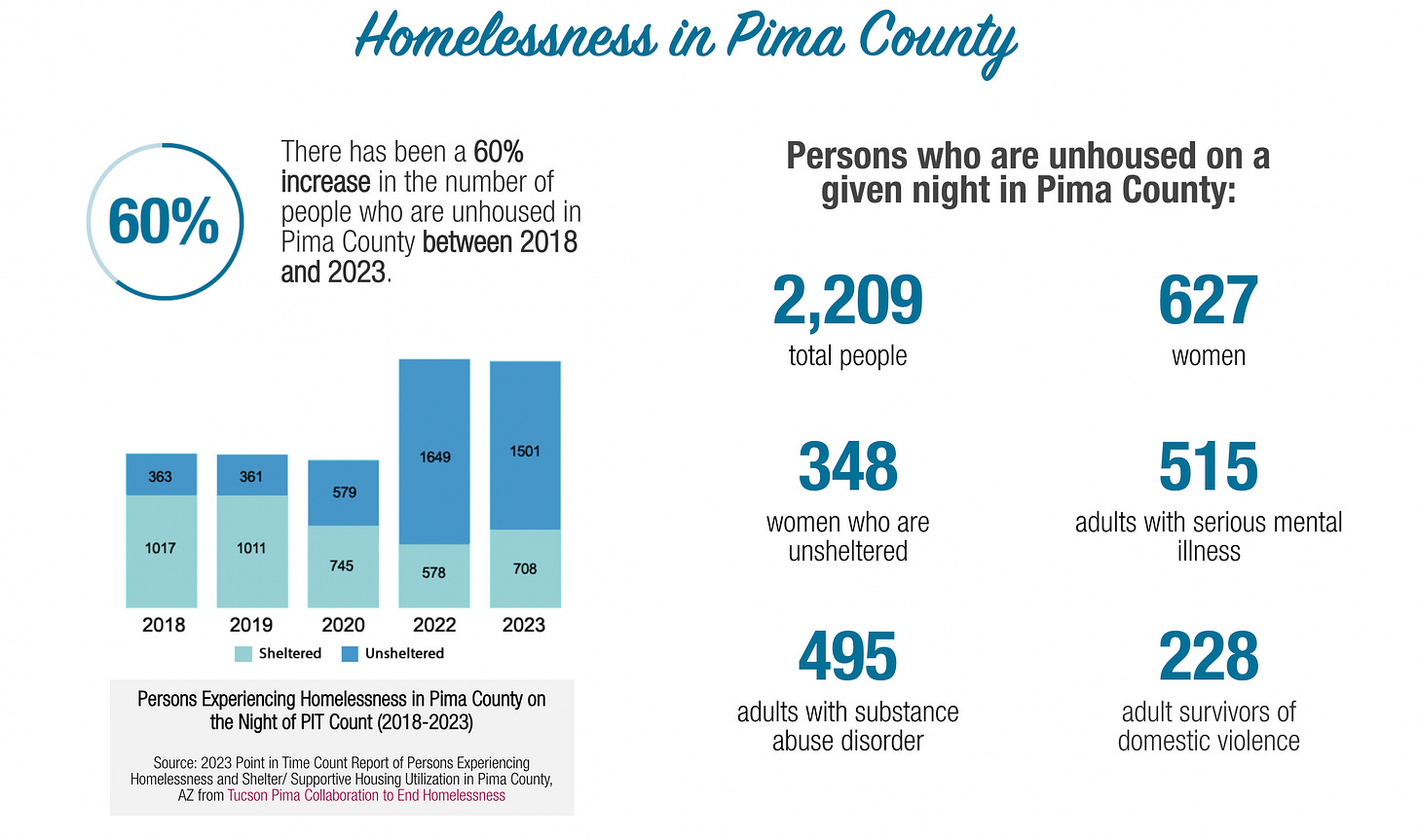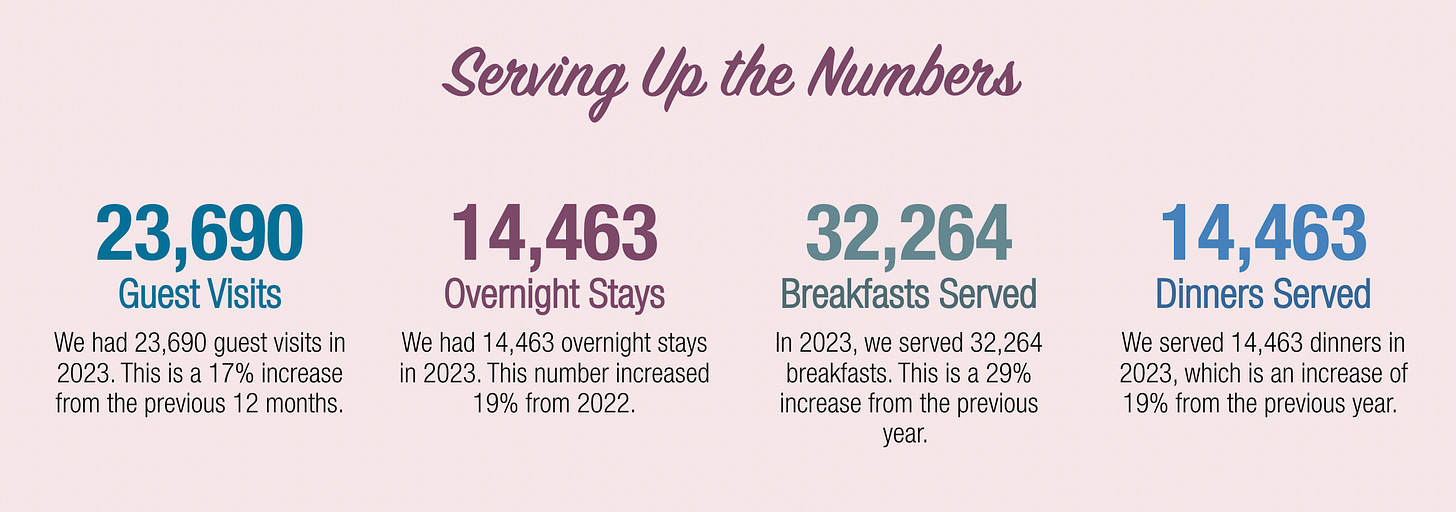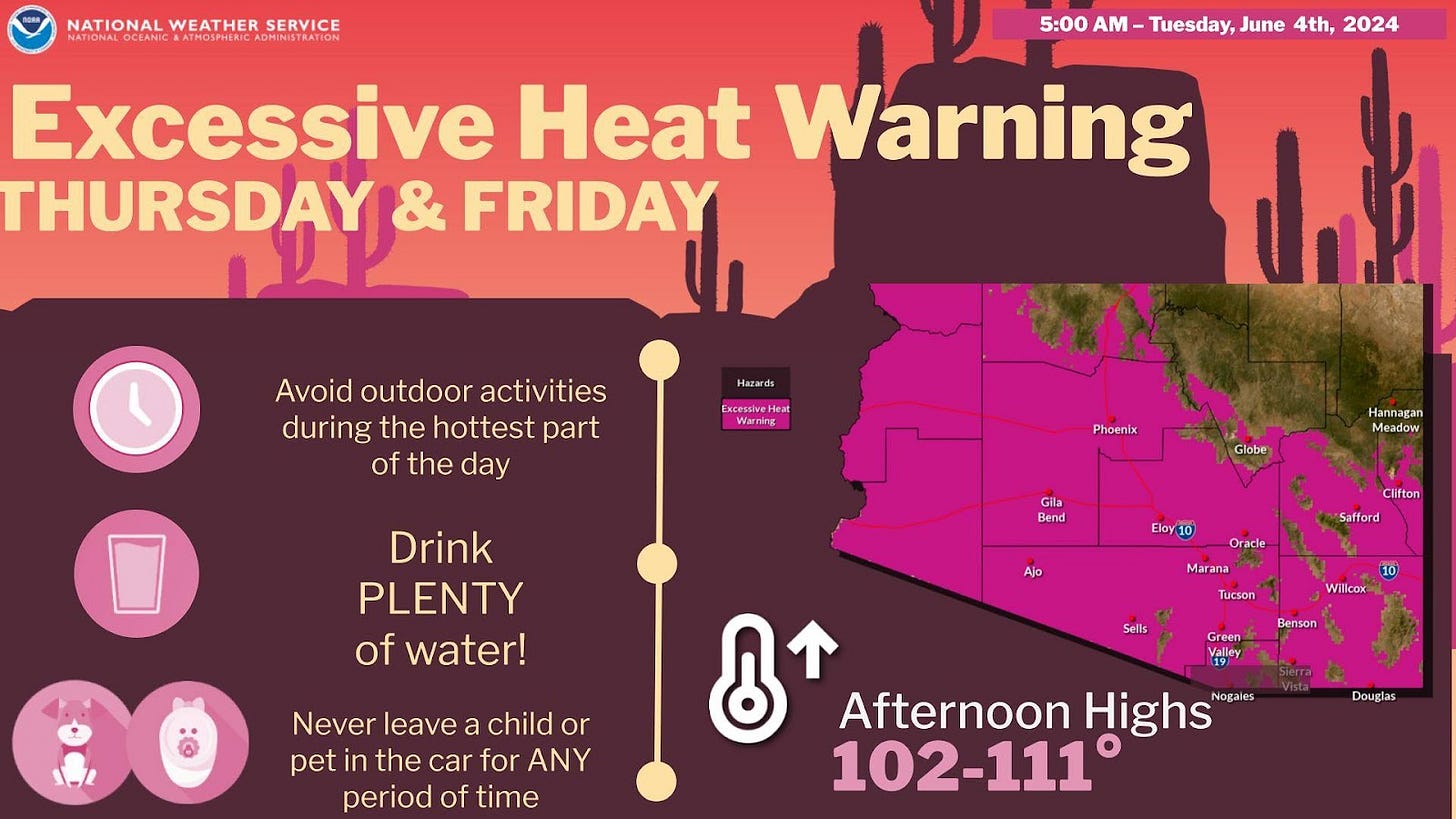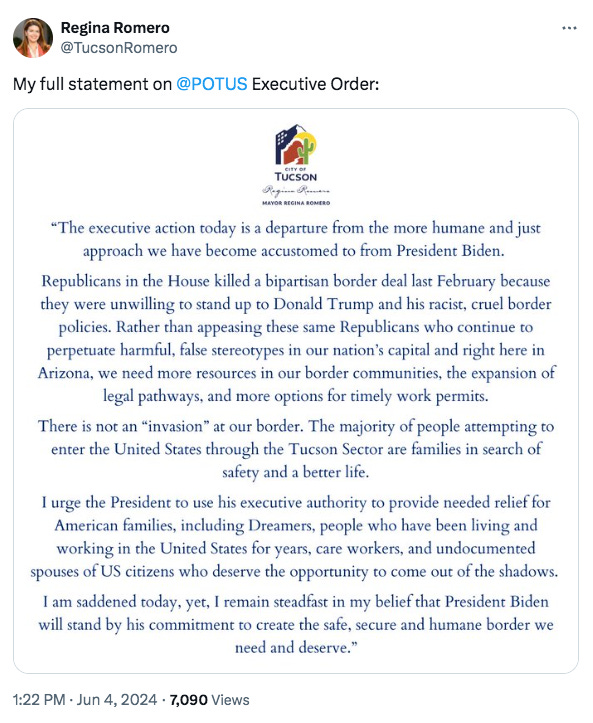The Student Agenda: Helping Tucson's unseen, unhoused women
Sister José Women’s Center provided 14,000 overnight stays for unhoused women last year ... Its low-barrier approach makes it easier for women to seek help ... Border politics all over the place.
Today we’re publishing the last of the student stories produced during Caitlin’s reporting public affairs class at the University of Arizona School of Journalism. For their final project, students were tasked with highlighting a local solution that impacts the community.
We’re wrapping up the series with a piece by Isabella Condon.
The average high temperature in Tucson during summer months is 102 degrees, creating a life-threatening situation for unhoused people who lack regular access to cool spaces and shade.
That’s one of the reasons organizations like Sister José Women’s Center play such a pivotal role in the community during summer months, when they provide a cool, safe place for women who are otherwise without shelter.
And with women over the age of 65 now one of the fastest growing groups of people facing homelessness, Sister José, located near downtown, is working tirelessly to provide services to a growing population, while also adapting to the new needs of its aging clientele.
The 2023 Point in Time Count Report of Persons Experiencing Homelessness report revealed a 300% increase in the number of people experiencing unsheltered homelessness in Pima County between 2018 and 2023, meaning they aren’t spending the night in emergency shelters or in transitional, or temporary housing.
That same report showed that on any given night last year, 2,209 people were unhoused. Nearly 630 of those people were women and 228 were survivors of domestic violence.
“You might not see them, because most women will stay hidden because it’s so dangerous out there,” Penny Buckley, Sister José’s director of grants, said during a presentation at November’s TENWEST Impact Festival. “People think, ‘They don’t want help.’ Well, my women want help.”
Buckley said the group of women served by the center are the area’s most challenged, since many are disabled due to illness, chronic illness, mental health or mobility issues.
Sister José has both day and overnight programs and offers emergency services, including meals, clothing, showers, and laundry, to an average of 80 women each day. It can accommodate 52 women at a time in its overnight program, which involves staying at the center for at least a week.
Women can also stay for longer than a week under the center’s “impact project,” which includes case management and other services to help those guests determine their next steps. The center regularly has a waitlist for its overnight program and uses a lottery system to decide who will get a bed when it becomes available.
Sister José employs on-site case navigators to provide guests with mentorship and resources to help them transition to stable housing. Case navigators help the guests establish and reach goals that prepare them to overcome barriers, navigate social services and enter the rental or job market.
The center is considered a low-barrier shelter, meaning that it removes obstacles in order to serve as many people as possible. One example of this is not requiring people to present identification in order to access services.
The idea is to respect the dignity of the person coming in, according to Buckley.
Another thing that sets Sister José apart from other shelters is that it allows guests to keep their dogs overnight. Of the 11 shelters in Tucson, Sister José is the only one that permits pets.
Sister José CEO Nicola Hartmann said this can make all the difference for women seeking aid, particularly elderly women.
“Dogs provide a sense of security both physically and emotionally for people without housing,” she said.
A study by the National Healthcare for the Homeless Council showed that approximately 50% of people experiencing homelessness are also victims of violence. These numbers are even higher for the elderly.
With rising rent across town, it can be challenging for people on a fixed income, like Social Security, to find a place to live. And with breed restrictions in place at many apartments in Tucson, it can be even harder for people with a dog.
Volunteers at the center say it’s not always easy to have so many dogs in one space, but they’ve not had any serious problems. Each dog is required to be on a leash in all public areas and they are all provided with crates for bedtime.
It seems like Sister José’s dog-friendly approach is making an impact. In 2023, the center reported nearly 24,000 “guest visits,” including 14,000 overnight stays. Many of these women would likely not have been able to stay at other shelters because of their dogs.
Because of the growing need for its services, Sister José began the first phase of an expansion project earlier this year that will increase available services in all areas. Now, the center can now accommodate nearly 60 women for overnight stays.
The downside is that this has cut down on the amount of clothing donations the center is able to accept, since the new beds are in the former donation area of the building. And while space is a challenge, CEO Hartmann is adamant the expansion will allow them to serve more women overall in the long run.
We reported in January that there were only 50 emergency shelter beds for women in Tucson, so the expansion of Sister José’s overnight program is a big deal, given the scarce supply.
Work is also underway at the nonprofit Primavera Foundation to expand its services for women, with the understanding that unsheltered women typically need more time to stabilize than their male counterparts.
Sister José’s Buckley is familiar with this, too, but says that giving women that extra time to get on their feet and build that community makes a huge difference in the long-run.
“The suffering I see is incredible, and it’s because the safety net is shredded. There is no safety net,” Buckley said. “It takes days. It takes weeks of just resting and sleeping and knowing that you can be there.”
A long and winding road: As the Arizona Board of Regents publicize the traits they’re looking for in a new president of the University of Arizona, the Tucson Sentinel’s Paul Ingram traces the controversies that have dogged UA President Robert C. Robbins since he took the helm in 2017.
Free-ish speech: The Regents are slated to vote on banning “support for foreign terrorist organizations by student groups and organizations” at their meeting Thursday, the Arizona Luminaria’s Becky Pallack reports. If student groups violate the policy, they would lose their right to use university facilities. The policy points to the need for students who are “Jewish, Israeli, Muslim, Arab, or Palestinian” to have a school environment free from discrimination.
Lots of money: The Arizona Department of Public Safety said the cost of implementing HCR 2060, the SB 1070-type ballot measure state legislators voted yesterday to put on the ballot in November, would exceed $40 million a year, the Arizona Mirror’s Gloria Rebecca Gomez reported. The measure doesn’t include funding, which violates Arizona law that requires a funding stream for ballot measures.
Political maneuvering: President Joe Biden signed an executive order Tuesday to restrict asylum at the U.S.-Mexico border, the Associated Press’ Seung Min Kim, Colleen Long, and Elliot Spagat reported. The order likely will take effect immediately because the threshold is a daily average of 2,500 encounters with migrants, which already is higher than the daily average now. The policy faces all kinds of hurdles, including lack of funding to enforce it and no agreement with the Mexican government to take back people from certain countries.
Need more money: The Pima County supervisors said at their Tuesday meeting they plan to ask the federal government for more money to support asylum seekers, the Luminaria’s John Washington reports. The next batch of funds likely will see more applicants from throughout the country, leading county officials to worry they might end up without enough funding.
Passport to Tucson: As students leave the UA for the summer and snowbirds fly home, locals are getting better deals at restaurants, resorts, and a long, long list of other establishments through the Southern Arizona Attractions Alliance’s passport program, the Arizona Daily Star’s Cathalena Burch reports.
200%: The increase in the number of people experiencing chronic homelessness in Pima County between 2018 and 2023, according to the annual point in time count. Chronic homelessness is when a person is homeless for at least a year or repeatedly, while also struggling with a disabling condition, like mental illness, substance use disorder or physical disability.










Very nice letter from Mayor Romero. As i understood it, she promised at one point publicly to write a similar letter about the conflict in Gaza but I have never seen it. I wonder if the pressure from the Zionist community became so strong that she decided the political cost was too high?